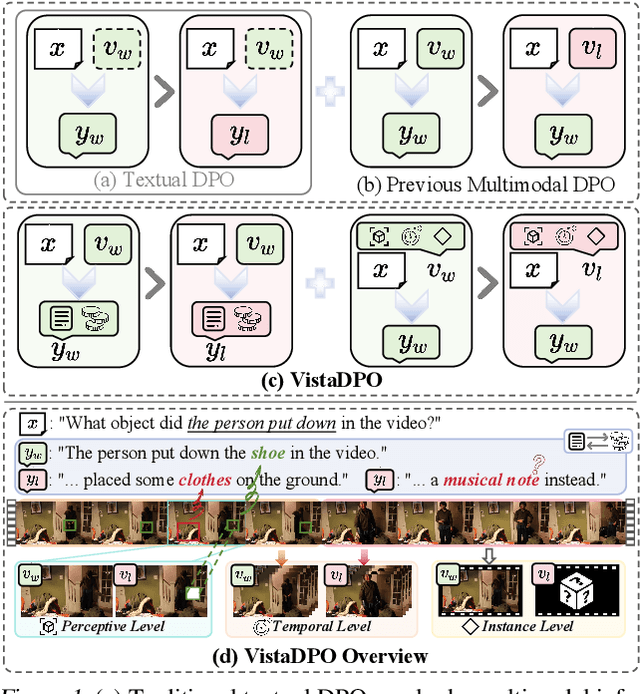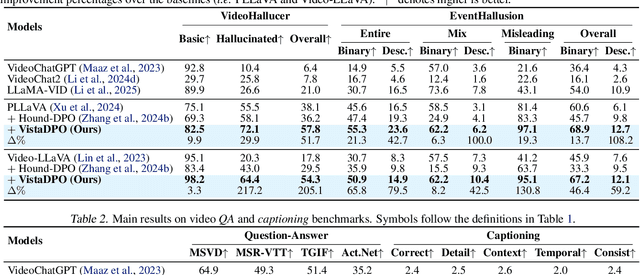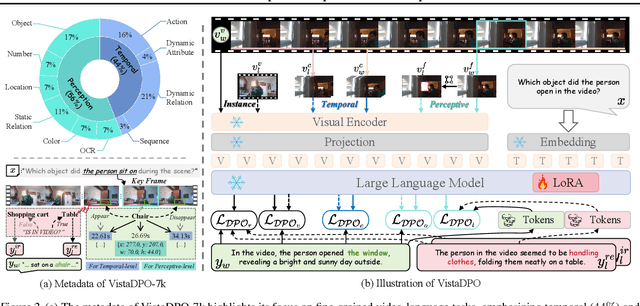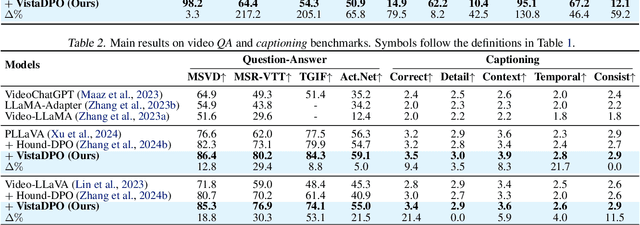Meng Luo
Unveiling the Cognitive Compass: Theory-of-Mind-Guided Multimodal Emotion Reasoning
Feb 01, 2026Abstract:Despite rapid progress in multimodal large language models (MLLMs), their capability for deep emotional understanding remains limited. We argue that genuine affective intelligence requires explicit modeling of Theory of Mind (ToM), the cognitive substrate from which emotions arise. To this end, we introduce HitEmotion, a ToM-grounded hierarchical benchmark that diagnoses capability breakpoints across increasing levels of cognitive depth. Second, we propose a ToM-guided reasoning chain that tracks mental states and calibrates cross-modal evidence to achieve faithful emotional reasoning. We further introduce TMPO, a reinforcement learning method that uses intermediate mental states as process-level supervision to guide and strengthen model reasoning. Extensive experiments show that HitEmotion exposes deep emotional reasoning deficits in state-of-the-art models, especially on cognitively demanding tasks. In evaluation, the ToM-guided reasoning chain and TMPO improve end-task accuracy and yield more faithful, more coherent rationales. In conclusion, our work provides the research community with a practical toolkit for evaluating and enhancing the cognition-based emotional understanding capabilities of MLLMs. Our dataset and code are available at: https://HitEmotion.github.io/.
Multi-Agent Intelligence for Multidisciplinary Decision-Making in Gastrointestinal Oncology
Dec 23, 2025Abstract:Multimodal clinical reasoning in the field of gastrointestinal (GI) oncology necessitates the integrated interpretation of endoscopic imagery, radiological data, and biochemical markers. Despite the evident potential exhibited by Multimodal Large Language Models (MLLMs), they frequently encounter challenges such as context dilution and hallucination when confronted with intricate, heterogeneous medical histories. In order to address these limitations, a hierarchical Multi-Agent Framework is proposed, which emulates the collaborative workflow of a human Multidisciplinary Team (MDT). The system attained a composite expert evaluation score of 4.60/5.00, thereby demonstrating a substantial improvement over the monolithic baseline. It is noteworthy that the agent-based architecture yielded the most substantial enhancements in reasoning logic and medical accuracy. The findings indicate that mimetic, agent-based collaboration provides a scalable, interpretable, and clinically robust paradigm for automated decision support in oncology.
Nexus: Execution-Grounded Multi-Agent Test Oracle Synthesis
Oct 30, 2025Abstract:Test oracle generation in non-regression testing is a longstanding challenge in software engineering, where the goal is to produce oracles that can accurately determine whether a function under test (FUT) behaves as intended for a given input. In this paper, we introduce Nexus, a novel multi-agent framework to address this challenge. Nexus generates test oracles by leveraging a diverse set of specialized agents that synthesize test oracles through a structured process of deliberation, validation, and iterative self-refinement. During the deliberation phase, a panel of four specialist agents, each embodying a distinct testing philosophy, collaboratively critiques and refines an initial set of test oracles. Then, in the validation phase, Nexus generates a plausible candidate implementation of the FUT and executes the proposed oracles against it in a secure sandbox. For any oracle that fails this execution-based check, Nexus activates an automated selfrefinement loop, using the specific runtime error to debug and correct the oracle before re-validation. Our extensive evaluation on seven diverse benchmarks demonstrates that Nexus consistently and substantially outperforms state-of-theart baselines. For instance, Nexus improves the test-level oracle accuracy on the LiveCodeBench from 46.30% to 57.73% for GPT-4.1-Mini. The improved accuracy also significantly enhances downstream tasks: the bug detection rate of GPT4.1-Mini generated test oracles on HumanEval increases from 90.91% to 95.45% for Nexus compared to baselines, and the success rate of automated program repair improves from 35.23% to 69.32%.
EMULATE: A Multi-Agent Framework for Determining the Veracity of Atomic Claims by Emulating Human Actions
May 22, 2025



Abstract:Determining the veracity of atomic claims is an imperative component of many recently proposed fact-checking systems. Many approaches tackle this problem by first retrieving evidence by querying a search engine and then performing classification by providing the evidence set and atomic claim to a large language model, but this process deviates from what a human would do in order to perform the task. Recent work attempted to address this issue by proposing iterative evidence retrieval, allowing for evidence to be collected several times and only when necessary. Continuing along this line of research, we propose a novel claim verification system, called EMULATE, which is designed to better emulate human actions through the use of a multi-agent framework where each agent performs a small part of the larger task, such as ranking search results according to predefined criteria or evaluating webpage content. Extensive experiments on several benchmarks show clear improvements over prior work, demonstrating the efficacy of our new multi-agent framework.
On Path to Multimodal Generalist: General-Level and General-Bench
May 07, 2025Abstract:The Multimodal Large Language Model (MLLM) is currently experiencing rapid growth, driven by the advanced capabilities of LLMs. Unlike earlier specialists, existing MLLMs are evolving towards a Multimodal Generalist paradigm. Initially limited to understanding multiple modalities, these models have advanced to not only comprehend but also generate across modalities. Their capabilities have expanded from coarse-grained to fine-grained multimodal understanding and from supporting limited modalities to arbitrary ones. While many benchmarks exist to assess MLLMs, a critical question arises: Can we simply assume that higher performance across tasks indicates a stronger MLLM capability, bringing us closer to human-level AI? We argue that the answer is not as straightforward as it seems. This project introduces General-Level, an evaluation framework that defines 5-scale levels of MLLM performance and generality, offering a methodology to compare MLLMs and gauge the progress of existing systems towards more robust multimodal generalists and, ultimately, towards AGI. At the core of the framework is the concept of Synergy, which measures whether models maintain consistent capabilities across comprehension and generation, and across multiple modalities. To support this evaluation, we present General-Bench, which encompasses a broader spectrum of skills, modalities, formats, and capabilities, including over 700 tasks and 325,800 instances. The evaluation results that involve over 100 existing state-of-the-art MLLMs uncover the capability rankings of generalists, highlighting the challenges in reaching genuine AI. We expect this project to pave the way for future research on next-generation multimodal foundation models, providing a robust infrastructure to accelerate the realization of AGI. Project page: https://generalist.top/
VistaDPO: Video Hierarchical Spatial-Temporal Direct Preference Optimization for Large Video Models
Apr 17, 2025



Abstract:Large Video Models (LVMs) built upon Large Language Models (LLMs) have shown promise in video understanding but often suffer from misalignment with human intuition and video hallucination issues. To address these challenges, we introduce VistaDPO, a novel framework for Video Hierarchical Spatial-Temporal Direct Preference Optimization. VistaDPO enhances text-video preference alignment across three hierarchical levels: i) Instance Level, aligning overall video content with responses; ii) Temporal Level, aligning video temporal semantics with event descriptions; and iii) Perceptive Level, aligning spatial objects with language tokens. Given the lack of datasets for fine-grained video-language preference alignment, we construct VistaDPO-7k, a dataset of 7.2K QA pairs annotated with chosen and rejected responses, along with spatial-temporal grounding information such as timestamps, keyframes, and bounding boxes. Extensive experiments on benchmarks such as Video Hallucination, Video QA, and Captioning performance tasks demonstrate that VistaDPO significantly improves the performance of existing LVMs, effectively mitigating video-language misalignment and hallucination. The code and data are available at https://github.com/HaroldChen19/VistaDPO.
Aristotle: Mastering Logical Reasoning with A Logic-Complete Decompose-Search-Resolve Framework
Dec 22, 2024Abstract:In the context of large language models (LLMs), current advanced reasoning methods have made impressive strides in various reasoning tasks. However, when it comes to logical reasoning tasks, major challenges remain in both efficacy and efficiency. This is rooted in the fact that these systems fail to fully leverage the inherent structure of logical tasks throughout the reasoning processes such as decomposition, search, and resolution. To address this, we propose a logic-complete reasoning framework, Aristotle, with three key components: Logical Decomposer, Logical Search Router, and Logical Resolver. In our framework, symbolic expressions and logical rules are comprehensively integrated into the entire reasoning process, significantly alleviating the bottlenecks of logical reasoning, i.e., reducing sub-task complexity, minimizing search errors, and resolving logical contradictions. The experimental results on several datasets demonstrate that Aristotle consistently outperforms state-of-the-art reasoning frameworks in both accuracy and efficiency, particularly excelling in complex logical reasoning scenarios. We will open-source all our code at https://github.com/Aiden0526/Aristotle.
PAD: Personalized Alignment at Decoding-Time
Oct 14, 2024



Abstract:Aligning with personalized preferences, which vary significantly across cultural, educational, and political differences, poses a significant challenge due to the computational costs and data demands of traditional alignment methods. In response, this paper presents Personalized Alignment at Decoding-time (PAD), a novel framework designed to align LLM outputs with diverse personalized preferences during the inference phase, eliminating the need for additional training. By introducing a unique personalized reward modeling strategy, this framework decouples the text generation process from personalized preferences, facilitating the generation of generalizable token-level personalized rewards. The PAD algorithm leverages these rewards to guide the decoding process, dynamically tailoring the base model's predictions to personalized preferences. Extensive experimental results demonstrate that PAD not only outperforms existing training-based alignment methods in terms of aligning with diverse preferences but also shows significant generalizability to preferences unseen during training and scalability across different base models. This work advances the capability of LLMs to meet user needs in real-time applications, presenting a substantial step forward in personalized LLM alignment.
Effi-Code: Unleashing Code Efficiency in Language Models
Oct 14, 2024Abstract:As the use of large language models (LLMs) for code generation becomes more prevalent in software development, it is critical to enhance both the efficiency and correctness of the generated code. Existing methods and models primarily focus on the correctness of LLM-generated code, ignoring efficiency. In this work, we present Effi-Code, an approach to enhancing code generation in LLMs that can improve both efficiency and correctness. We introduce a Self-Optimization process based on Overhead Profiling that leverages open-source LLMs to generate a high-quality dataset of correct and efficient code samples. This dataset is then used to fine-tune various LLMs. Our method involves the iterative refinement of generated code, guided by runtime performance metrics and correctness checks. Extensive experiments demonstrate that models fine-tuned on the Effi-Code show significant improvements in both code correctness and efficiency across task types. For example, the pass@1 of DeepSeek-Coder-6.7B-Instruct generated code increases from \textbf{43.3\%} to \textbf{76.8\%}, and the average execution time for the same correct tasks decreases by \textbf{30.5\%}. Effi-Code offers a scalable and generalizable approach to improving code generation in AI systems, with potential applications in software development, algorithm design, and computational problem-solving. The source code of Effi-Code was released in \url{https://github.com/huangd1999/Effi-Code}.
PanoSent: A Panoptic Sextuple Extraction Benchmark for Multimodal Conversational Aspect-based Sentiment Analysis
Aug 18, 2024



Abstract:While existing Aspect-based Sentiment Analysis (ABSA) has received extensive effort and advancement, there are still gaps in defining a more holistic research target seamlessly integrating multimodality, conversation context, fine-granularity, and also covering the changing sentiment dynamics as well as cognitive causal rationales. This paper bridges the gaps by introducing a multimodal conversational ABSA, where two novel subtasks are proposed: 1) Panoptic Sentiment Sextuple Extraction, panoramically recognizing holder, target, aspect, opinion, sentiment, rationale from multi-turn multi-party multimodal dialogue. 2) Sentiment Flipping Analysis, detecting the dynamic sentiment transformation throughout the conversation with the causal reasons. To benchmark the tasks, we construct PanoSent, a dataset annotated both manually and automatically, featuring high quality, large scale, multimodality, multilingualism, multi-scenarios, and covering both implicit and explicit sentiment elements. To effectively address the tasks, we devise a novel Chain-of-Sentiment reasoning framework, together with a novel multimodal large language model (namely Sentica) and a paraphrase-based verification mechanism. Extensive evaluations demonstrate the superiority of our methods over strong baselines, validating the efficacy of all our proposed methods. The work is expected to open up a new era for the ABSA community, and thus all our codes and data are open at https://PanoSent.github.io/
 Add to Chrome
Add to Chrome Add to Firefox
Add to Firefox Add to Edge
Add to Edge